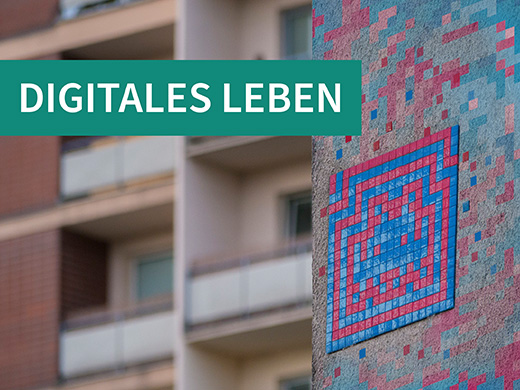

Digital life – how digitization is transforming our everyday lives
MOOC series
Univ.-Prof. Dr. Fares Kayali
About
We live in an increasingly connected world – a world of digital opportunities and challenges.
The units of the MOOC series “Digitales Leben” (“Digital Life”) explore different aspects of the digital transformation and cover a wide range of topics, such as the digital transformation in healthcare and law, moral questions about sex robotics, algorithmic bias within institutions, changes related to journalism and the media landscape, the significance of human-computer interfaces and hacking and making as active participation. The “Digitales Leben” MOOCs enable participants to get insights and opinions from experts and researchers.
Each unit in this MOOC series is self-contained. As a course participant, you can choose your own learning path. In each course, interactive elements and a mentored forum, available from October to January, will support you on your journey through the digital transformation. Welcome to the “Digitales Leben” series!
Units and lecturers
Digital Life 1
- Digital transformation in health care – Univ.-Prof. Dr. Ulrike Felt
- Digital transformation in law – Univ.-Prof. Dr. Nikolaus Forgó
- Robot ethics – Dr. Janina Loh, MA
- Algorithms and democracy – Dr. Harald Katzmair, PhD; Univ.-Prof. Louise Amoore, PhD
- Participating in the digital society – Univ.-Prof. Dr. Armin Nassehi; Univ.-Prof. Dr. Bettina Amrhein; FH-Prof. Dr. Martina Tißberger
Digital Life 2
- Using Kant as a compass: four questions about digital life – Univ.-Prof. Dr. Peter Reichl
- Algorithmic bias – Sabrina Burtscher, BSc & Ao. Univ.-Prof. Dr. Peter Purgathofer
- The digital transformation of knowledge management – Univ.-Prof. Dr. Ronald Maier
- The digital transformation of reading: book or screen? – Univ.-Prof. Dr. Susanne Reichl
- DigiTransform: media, journalism, and media management – Priv.-Doz. Dr. Paul Murschetz
Digital Life 3
- Human-centered design and participation for successful human-computer interaction – Univ.-Prof. Dr. Renate Motschnig
- Designing digital futures – Univ.-Prof. Christopher Frauenberger, PhD
- Digital games: more than entertainment – Mag. Daniel Handle-Pfeiffer & Univ.-Prof. Dr. Fares Kayali & DI Matthias Steinböck
- Learning from hackers: taking control of digital developments – Univ.-Prof. Sarah R. Davies, PhD
- Digital networks and the public – Univ.-Prof. Dr. Annie Waldherr
Digital Life 4
- Digital responsibility and equal opportunities – Univ.-Prof. Dr. Sabine T. Köszegi & Mag. Doris Schmidauer & Dr. Beate Winkler
- Aging, care, and technology – Univ.-Prof. Geraldine Fitzpatrick, PhD
- Information quality: digital responsibility & citizenship education – Univ.-Prof. Dr. Dirk Lange & Johanna Taufner, MA MSc
- Trust and accountability in the time of Big Data – Mag. Dr. Katja Mayer
- Digital Humanities and scholarly accountability – Univ.-Prof. Dr. Tara L. Andrews
Digital Life 5
- E-learning, technology enhanced learning, digital teaching – Priv.-Doz. Dr. Martin Ebner
- Artificial intelligence and society: does the future have ethics? – Dr. Michael Funk, MA
- Future of interaction: human-robot relationships in the digital world – Ass.-Prof. Dr. Astrid Weiss
- Digital culture: can technology improve the world? – Gerfried Stocker
- Youth, activism, networking: digital education in the age of AI – Matthias Jax, MA
Series image: Original title: Morzinplatz Space Invader.JPG. Description: Space Invader mosaic at Vienna’s Morzinplatz. Author: Thomas Ledl. License: CC BY-SA 4.0 (https://creativecommons.org/licenses/by-sa/4.0/legalcode). Origin: https://commons.wikimedia.org/wiki/File:Morzinplatz_Space_Invader.JPG. Changes: flipping, color adjustment, addition of text and graphics elements. Edited by: Center for Teaching and Learning, University of Vienna.